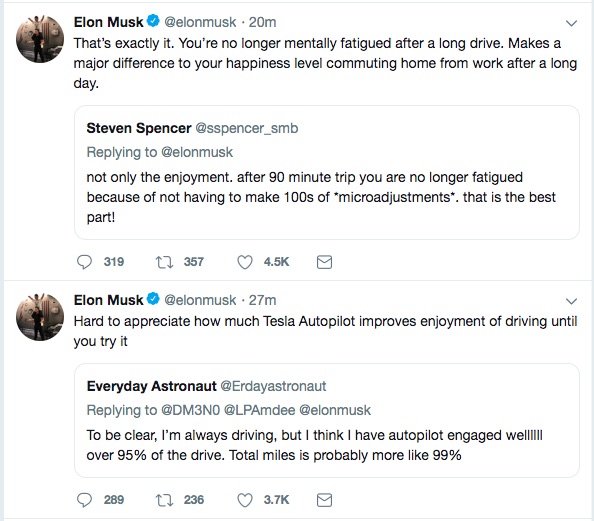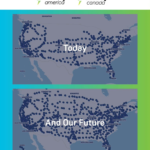How much is “peace of mind” worth on your daily commute? If you arrive at the office well rested, or arrive home well rested, even after a 50 mile grind through logjammed traffic, is that “well rested” state justification for paying a premium price for a car? Tesla’s CEO Elon Musk claimed on Twitter today that because Tesla Autopilot takes care of most of the driving decisions, the driver has less to pay attention to, and therefore arrives at the office or at home more rested than if they had driven a car lacking autopilot features.
For several years Tesla has claimed their cars reap a variety of benefits, both monetary and non-monetary, that together are valuable enough to justify the premium price one pays. I recall that Tesla first made this claim in the 2013ish time frame, and cannot find my reporting on this. However on GreenTransportation.info Tesla’s justifications inspired me to write a table summarizing the various cost benefits of electric car![]() .
.
One idea is that electric cars are bliss-filled islands of serenity![]() and that should be of some value. I wrote this before the advent of any kind of driver assist or autopilot features, so at that time the focus was on noise and vibration. Gasoline/diesel vehicles have an internal combustion engine making hundreds (thousands?) of explosions per minute, causing vibrations and noise to permeate not only the car but the surrounding environment.
and that should be of some value. I wrote this before the advent of any kind of driver assist or autopilot features, so at that time the focus was on noise and vibration. Gasoline/diesel vehicles have an internal combustion engine making hundreds (thousands?) of explosions per minute, causing vibrations and noise to permeate not only the car but the surrounding environment.
Studies have shown that noise pollution is a huge problem in its own right. Traffic noise is widely regarded as a source of fatigue. According to the World Health Organization “Excessive noise seriously harms human health and interferes with people’s daily activities at school, at work, at home and during leisure time. It can disturb sleep, cause cardiovascular and psychophysiological effects, reduce performance and provoke annoyance responses and changes in social behaviour.“
Back when I did a test drive of the Ford Transit Connect Electric (the one which Ford designed in collaboration with Azure Dynamics), we were told of health studies of commercial drivers who drove the diesel Transit Connect versus the electric model. Drivers of the electric model reported a much better state of health and satisfaction because the of the lack of noise and vibration.
But… in these tweets, Elon Musk is making a related but different argument.
Observe yourself while driving and you might notice (as I do) a constant risk of smashing into the car in front of you, or being smashed into by the car behind, or by the truck in the next lane. This risk rises in heavy traffic such as commute hours in dense urban areas.
Stop-and-Go traffic could also be described as Whoops-and-Smash traffic.
One slight mistake could mean smashing into or being smashed into other vehicles, along with the possibility of pain and suffering and fire and death.
What kind of toll does this take on drivers in traffic?
If you arrive at the office tensed up because the traffic was bad, how does this affect your day at the job? After arriving home driving for an hour (or more) through bad traffic, are you as loving as possible with your spouse and kids?
What Elon Musk observes here is that because Autopilot takes over a lot of the micro-decisions every driver constantly makes, the driver has a smaller cognitive burden. er… Tesla Autopilot takes a load of worries-from-driving off your mind. You therefore should arrive in a better frame of mind.
There was a rock song from the 60’s or 70’s with a line about being strung out from the road. We have all had that experience, that after some time behind the wheel we’re “strung out” and need to settle down for awhile. The healthiest way of driving a long distance trip is to take a break every 3-4 hours for at least a half hour, to walk around a bit, maybe have a small meal or snack, with a key worry being this “strung out” feeling.
On Facebook and other areas I’m constantly seeing Tesla Model 3 owners glowingly exclaiming how their Model 3 is the best car they’ve ever owned. How much of that is the Autopilot relieving from them the burden of these constant microdecisions and constant risk of accident/pain/suffering/etc?
What is the value to you of peacefulness?
On the other hand…..
All that peace-peace-bliss-bliss is great IF the Autopilot system is working as advertised. But what if the Autopilot system makes a mistake and accidentally drives the car into the gore point of a highway off/on-ramp? That has happened on multiple occasions, and at least once that scenario resulted in fiery death for a guy who was avidly excited by autonomous driving system capabilities.
In the software engineer side of my career it’s been made abundantly clear after 30 years of professionally writing software that every piece of software has bugs. Back in university, the Professors showed us theory from an early Computer Scientist or else Mathematician saying that even the most trivial of software has bugs. As proof we were shown a program consisting of just one instruction which had a bug.
The Tesla Autopilot and all the other driver assist features from the other automakers rely on SOFTWARE along with a combination of sensors (RADAR, LIDAR, cameras), software, and on-board high performance computation. The software is written using artificial intelligence techniques (a.k.a. Machine Learning) and is constructed to take in data from the sensors, and to make decisions about the traffic surrounding the car.
But … the ability of this software to do this safely is dependent on weeding out bugs in highly complex software systems.
As a software engineer I am very leery about the possibility of achieving good quality in such software in any reasonable length of time. My personal plan is to stave off for as long as possible use of driver assist or autonomous driving features. I’m willing to let other people be the guinea pigs on this.
- Is there enough Grid Capacity for Hydrogen Fuel Cell or Battery Electric cars? - April 23, 2023
- Is Tesla finagling to grab federal NEVI dollars for Supercharger network? - November 15, 2022
- Tesla announces the North American Charging Standard charging connector - November 11, 2022
- Lightning Motorcycles adopts Silicon battery, 5 minute charge time gives 135 miles range - November 9, 2022
- Tesla Autopilot under US Dept of Transportation scrutiny - June 13, 2022
- Spectacular CNG bus fire misrepresented as EV bus fire - April 21, 2022
- Moldova, Ukraine, Georgia, Russia, and the European Energy Crisis - December 21, 2021
- Li-Bridge leading the USA across lithium battery chasm - October 29, 2021
- USA increasing domestic lithium battery research and manufacturing - October 28, 2021
- Electrify America building USA/Canada-wide EV charging network - October 27, 2021




















Pingback: Tesla Autopilot danger from “passive vigilance” effect – The Long Tail Pipe
Pingback: Tesla under Dept of Transportation scrutiny over Autopilot system – The Long Tail Pipe